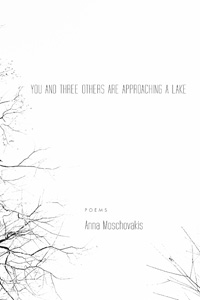

Reviewed July 6, 2012 by Caroline Davidson.
Perhaps poetry is a rhetorical mode of survival. Perhaps poetry is violence. If so, “What can a poem kill?” According to Anna Moschovakis, in her collection You and Three Others are Approaching a Lake, a poem can kill received ideas about logical, explanatory, argumentative rhetorical modes; it can kill our inherited understanding of the world’s political landscapes, and our accepted modes of intrapersonal and external communication. Moschovakis’s poetry appears to be an application of the theories of Nietzsche, De Man, Derrida, and subsequent Deconstructionists—her poetic “project” being to undermine or recess logic and the metaphysics of the West, replacing them with a foregrounding of the rhetorical elements of language, to show that metaphor and metonymy are more important than our traditional concepts of “truth” and “falsity.” For Moschovakis, Western “logical” modes of argumentation fail to constitute a valid conceptual framework for understanding the world, its systems of exchange, and its social formations where, as Moschovakis states, “[e]verything [is] helping itself/ to everything else.”
In the first of the book’s four long poems, the reader is given a logic puzzle to solve, beginning with the phrase that titles the book:
These “thought experiments” are given no definitive answers in this book, displaying the futility of philosophical/logical modes of argument, when contrasted with the unknowns of our world. What will we use our tools for? Violence or shelter? Conversation or safety? The language here is direct and unadorned, emulating that of deductive reasoning and the rhetoric of logic, while simultaneously challenging the validity of such devices: “We start not with theory but with tangible performance.” The speaker directly asks the reader to think about the possibilities of logic puzzles, of “thought experiments”:
Non-linear logic is employed by a vast array of contemporary poets, including Rosmarie Waldrop, Michael Palmer, and Rae Armantrout, but where they occasionally embellish such philosophical rhetoric with flights of lyricism, Moschovakis’s poetry remains direct and unadorned. This aversion to some of the tenets of the lyric (compression, sonic play, etc) keeps the reader’s focus on the particulars of each evolving experiment. The primary concern becomes the treatment of facts and the philosophical arguments they collectively enact. However, because these arguments operate with the lacunae we expect of poetry over the precision associated with philosophical reasoning, Moschovakis is able to draw the reader into her critique of Western metaphysical principles of absolutism and conclusive “meaning” by spotlighting the rhetoric in which these arguments are cast.
Moschovakis sees humans as conversation-making machines. We program ourselves according to certain stimuli and situations. Our world is programmable, and yet cannot be entirely understood through programmatic efforts, through scientific methods and natural systems of logic. Alan Turing, known as the father of computer science, attempted to standardize machine “intelligence” by testing through conversation whether or not a computer could be differentiated from a human being. Moschovakis explores human conversation and invention through Turing Tests and Peter Singer’s semantics in the section entitled “The Human Machine-Thirty Chances,” again raising the question of the validity of logic principles (x+y=”intelligence”). To program an “intelligent” conversation, the language must be direct and simple, like that of an algorithm. Moschovakis again employs this unadorned language of “programming” in her documentation and exploration of Alan Turing and chatbots.
Here, programming conversation to mimic natural speech patterns and recognizing appropriate, simple responses, in a language of “simple, obvious things,” shows how strange the idea of “simple, obvious things” can appear if brought under a direct spotlight. Algorithmic evidence is not conclusive for the “intelligent” machine.” Inputs into programs and machines produce a metonymic instance of conversation, but the results are inconclusive: “The best that can be said of the machine is that it does get through it, somehow.” Invention and technological progress, as well as scientific/philosophical and “logical” modes of thinking, are suspect modes of interpreting the existential world.
Continuing the interrogation of what constitutes progress, the section, “In Search of Wealth,” unfolds with newfound intimacy, as it moves through a second-person account of the speaker’s economic history. This section interweaves information about a tribal nation from New Guinea, with facts about venture capitalism, Tom Cruise and Scientology, differences in marriage practices and other systems of “exchange” in Western nations and third-world countries, as well as the speaker’s personal involvement with these concepts:
The inclusion of a subdued lyricism in this section provides a physical grounding to the larger discussions about wealth and guilt (“Now you are thirty nine and you are in Ethiopia.”) Although the second-person speaker is individual and has specified, tangible experiences, she also stands for a larger populace, one conflicted by the global incongruities engendered by Western capitalism: “Self-confidence can exist in an inverse relationship to feelings of guilt about the inequality of resources.” Moschovakis’s work is polemical, aiming to guide, but not necessarily convince its readers (“The problem is I don’t care whether I convince you or not”) to question and challenge societal conventions, “even modified ones.” While the book doesn’t purport to offer instruction on how, exactly, one becomes better able to live and thrive in a continually shifting, unstable, violent and irrational cultural condition—a condition filled with moments “of courage or loss or revolution/When something pushed something and something fell down,” it suggests that such a condition might not be the only one out there.
***
Caroline Davidson is the poetry editor for Timber Journal and is an MFA candidate at the University of Colorado-Boulder